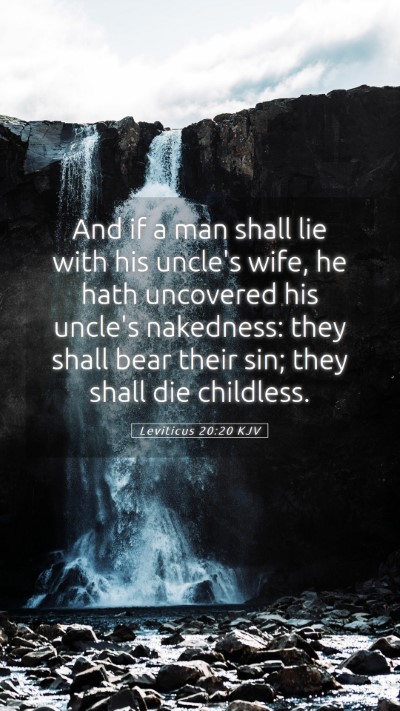Understanding Leviticus 20:20
Bible verse: Leviticus 20:20
Leviticus 20:20 states: "And if a man shall lie with his uncle's wife, he hath uncovered his uncle's nakedness: they shall bear their sin; they shall die childless."
Summary of the Verse
This verse falls within the larger context of laws in Leviticus that address sexual conduct and the boundaries of kinship. The gravity of the sin is highlighted, suggesting severe social and communal consequences—namely, childlessness, which in ancient Israelite culture was a significant loss and stigmatization.
Insights from Public Domain Commentaries
-
Matthew Henry's Commentary:
Henry explains that this law serves to maintain the sanctity of family relationships. He points out the severity of such actions not only in God’s eyes but within the community, suggesting that violations of these mandates disrupt familial order and divine law. The loss of offspring signifies a deeper, communal curse stemming from disobedience to God’s laws.
-
Albert Barnes' Notes:
Barnes emphasizes the implications of such relationships being a direct affront to God's established order. He clarifies that "uncovering nakedness" symbolizes a breaking of the sacred ties and is representative of dishonoring family bonds. The pronouncement of barrenness serves as a divine punishment aimed at restoring moral integrity within the community.
-
Adam Clarke's Commentary:
Clarke notes the symbolic nature of "childlessness" in the culture of Israel, where lineage and heritage were vital aspects of identity. He interprets this law as a protective measure for familial honor and societal structure. Clarke also talks about the importance of holiness in interpersonal relations, which God demands from His people.
Significance and Applications
Leviticus 20:20 not only emphasizes the importance of maintaining proper relationships within families but also reflects broader principles of sexual morality that align with later teachings throughout the Bible. The verse can be significant for those studying the moral and ethical implications of the Old Testament laws, offering insights into how these ancient statutes inform contemporary discussions on sexuality and family ethics.
For modern readers, applying the lessons of this verse may involve a deeper examination of the value placed on familial ties and the moral frameworks that guide personal relationships. Additionally, it can inspire reflection on the consequences of breaking moral and ethical boundaries within societies.
Cross References
- Leviticus 18:14: Addresses similar prohibitions concerning sexual relations with close relatives.
- Deuteronomy 22:30: Continues the discussion on incestuous relationships and their implications.
- 1 Corinthians 5:1-5: Paul speaks about sexual immorality within the church, depicting a parallel concern for maintaining holiness.
Conclusion
Understanding Leviticus 20:20 requires an analysis of its historical context and the significant moral implications it bears. The importance of this verse resonates through its teachings on family integrity and divine law. Engaging with this scripture enhances one's Bible study insights and deepens one's understanding of the comprehensive nature of God’s commandments.
Additional Bible Study Resources
For those interested in exploring this verse further, consider engaging with Bible study guides and tools that encourage detailed examination of difficult passages. Participating in Bible study groups can also provide communal insights and varied perspectives that enrich your understanding of such complex topics.


